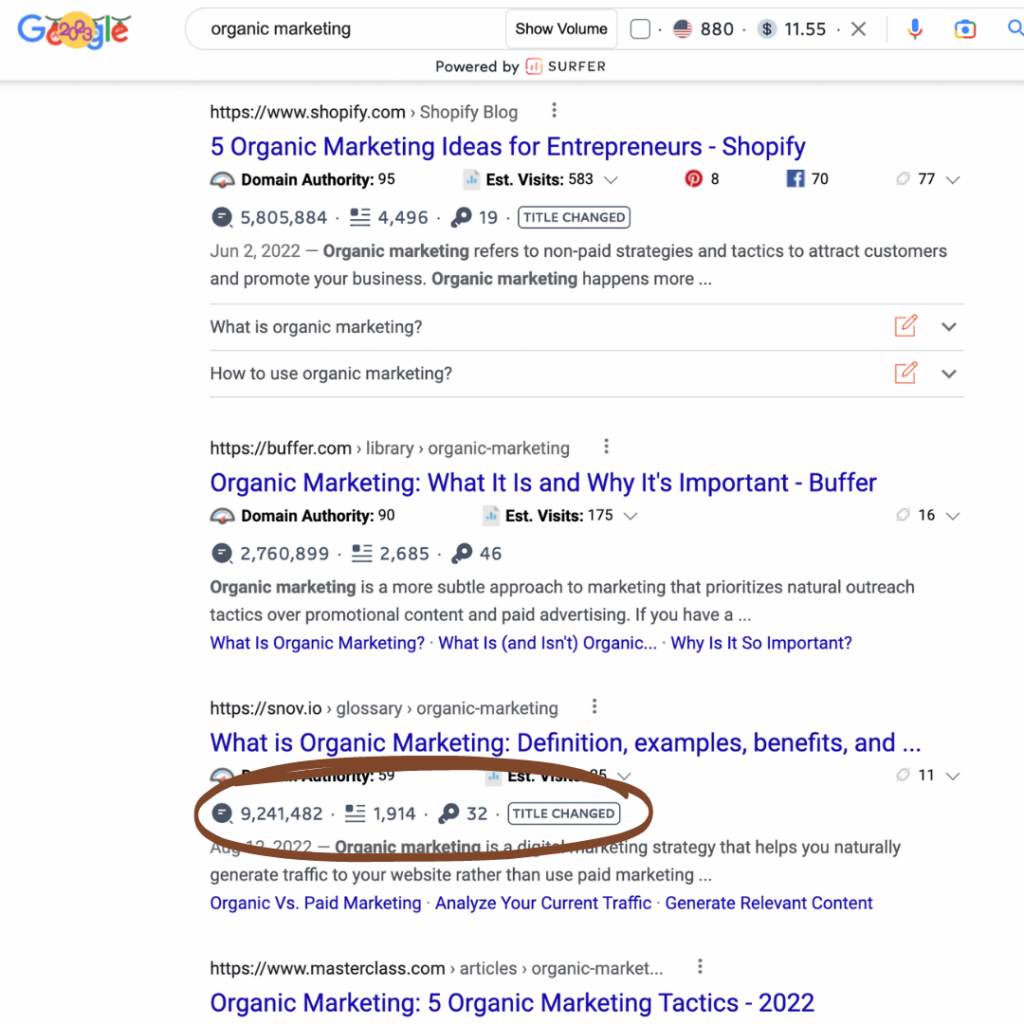Updated: January 2023
Apple Podcasts | Spotify
One of the best things about creating content is that there is always an opportunity to refresh it. With the launch of our podcast, this episode is the perfect example! This blog post about “4 free SEO keyword research tools” was one of the very first posts we’ve ever written. The details still rang true today, but we’ve also learned about a few more tools. So it was due time for a little refresh.
If search engine optimization (SEO) is new to you, then head back a little further and start with our first blog post: SEO for beginners. Here, we spell out exactly what SEO is, how search engines work, why you should care and finally what SEO keywords are. Once you understand what SEO keywords are you’ll be ready to dive into this blog post. Let’s dig into four of our favorite free SEO keyword research tools that you can use to find relevant, long-tail keywords for your content.
Four SEO Keyword Research Tools
1. Ubersuggest
First, we turn to one of the SEO experts, Neil Patel. His website, Ubersuggest is definitely one of our favorite free SEO keyword research tools. Their lifetime plans also make it incredibly affordable for entrepreneurs.
Some of our favorite keyword resources on Ubersuggest are:
- Google SERP (search engine result pages): you can easily see which websites are currently ranking for this keyword without having to hop on Google and research yourself.
- Volume by Month: this is amazing if you have a seasonal business or product. It allows you to understand when your audience might be searching for certain topics.
- Content Ideas: not only can you see what some popular headlines are for this specific keyword, but you can also see the number of backlinks each post has.
- [New] Keyword Lists: you can now create lists to capture all of the keywords in one place for a particular content bucket, client or competitor.
- [New] Labs: we also just started experimenting with Ubersuggest’s own AI writer and keyword generator tools.
2. Keyword Surfer
Keyword Surfer is a Chrome extension for content and keyword research. It allows you to do research right there on the Google search engine result page (SERP). You can see volume, cost per click, traffic, word count and how many times a keyword was used on each article. On the side bar, you can also view alternate keyword ideas.
Some reasons why we love this tool:
- Its completely free— obviously. 🙂
- When doing competitive and content research. We like to look at word and keyword count for those articles on page one so we can create content that is worthy of competing.
- See when Google changes the SEO Title. The “title change” bug lets us peek at the original title and make some assumptions on why Google might have changed it.

What about Keywords Everywhere
In the old version of this post, we shared Keywords Everywhere as one of our favorite keyword research tools. It is still an amazing research tool and plugin for both Chrome and Firefox. Unfortunately it’s no longer free. You buy credits and pay as you go.
What we love most about any browser extension is that it can be running in the background allowing us to continue being in an SEO-mindset as both a user and a marketer. If you are new to SEO, this is a perfect way to start thinking about how SEO works in your own life in order to leverage it as a business owner.
3. Answer The Public
Answer The Public is a gold mine of information into your audience’s mindset when searching. This tool quickly cranks out every useful phrase and question people are asking around your keyword. With this extra knowledge you can create fresh, useful content your audience is actually searching for. It not only expands your keyword reach opportunities, but it also gives you a more well-rounded piece of content.
This tool is especially helpful when creating your cornerstone content articles. Expanding on your topics by answering questions helps increase word count and make your content more searchable.
4. Google Trends and Exploding Topics
These are some of our favorite tools to use in the early keyword and content brainstorming process. Before we batch content for our blog, podcast or social media feeds.
Google Trends is a one-stop resource to see what’s trending in search around the world. This type of research can help make your content and marketing more relatable. Creating relevant and fresh content is important for Google and this is one of the best ways to start your research.
Exploding Topics is similar to Google Trends but more focused on the future. Rather than focusing on what’s trending now, this tool helps you get ahead of the curve. Exploding Topics analyzes millions of searches, mentions and conversations around the world to find trends before they are trends. You can search by industry and as far back as 15 years.
A Few Bonus Keyword Research Tools
Although we didn’t touch on these in the podcast episode, there are still dozens of keyword research tools at your finger tips. Here are a few more that are still worth your time exploring.
Google Keyword Planner
It’s hard to ignore the platform that understands keywords the best, our friend Google. Google has an SEO Keyword Research Tool called Google Keyword Planner. This tool is completely free, but the sign up process turns a lot of people away because it appears that you need to run an ad campaign first. Don’t worry, we will walk you through how to access this tool in a few quick and easy steps. Simply start by going to Keyword Planner and logging in with the appropriate Google account. Then follow the steps noted in the images below.

- You’ll see a page asking you for your main advertising goal. At the bottom there is a section that asks if you are an “expert”… guess what, today you are! Click that button
- On the next page you will see a prompt that says “create an account without a campaign”
- Congratulations! You’ve done it.
- You are now within the tool and can start researching your keywords
In order to start researching, you’ll go up to the settings and tools icon in the upper right hand corner and click “keyword planner”. From here you can discover new keywords or research search volumes and forecasts. We use this tool quite often when trying to determine various keywords for our website, blog, sales pages, etc. Simply type in the keyword you want to write about and see how often it’s searched for along with other keyword ideas. Let’s use the example “brand photography” in the screenshot below.

Google Keyword Planner tells us it’s searched on average between 1k-10k times per month. Now, we understand this is a little vague. Unfortunately, this is all you’ll get access to until you’ve run a campaign. After that, you are promised more insights. However, one of the reasons this is our favorite SEO keyword research tool is because it will automatically populate other keyword ideas like “personal branding photography”. Oftentimes we start here, ideate a few long-tail keywords and then head over to another tool in order to explore further.
The keyword ideas you find here on Google are guaranteed to be an accurate representation of what’s happening on the platform regardless of how deep the free insights go. When starting with Google, you wont need to worry about the validity of a keyword.
Did you know Pinterest is a search engine? That’s right, just like Google! Soon-to-be brides come to Pinterest to start planning their weddings. Those looking to create a healthier lifestyle might be searching for new diets or recipes. New homeowners may be searching for inspiration for their next house project. The list goes on and on. The one thing all these searchers have in common is that they are craving education and ready to learn. Not to mention, it’s the only search engine that is visually appealing. This is where us creative folks can really stand out!
So how do you use Pinterest as a tool to find keywords? More specifically, long-tail keywords? It’s pretty simple. Type in the topic you want to start creating content on and simply watch Pinterest populate the long-tail keyword based on what people are searching for most. See the image below to see how this works.
There you have it, our favorite SEO keyword research tools you can use that are completely free!
There are so many different tools out there, but these have been some of our favorites. They are also user-friendly, and easy to understand regardless of how advanced your SEO skills are. Finding free resources you actually enjoy using, feels like hitting the jackpot for any entrepreneur or small business owner. Some of these research tools we noted above won’t give you everything in one spot unless you pay for a plan. But leveraging two of these tools when researching keywords will help paint a bigger picture. We truly do love all of these tools and bounce in and out of each of them when we are researching for our own content calendar.
Now what? How do I choose a good keyword or topic to write for?
We are glad you asked! Choosing the best SEO keyword for your content is one of the hiccups many people come across. It’s important to choose a keyword that has a decent monthly search volume, low competition and a high cost-per-click.
Our final tip for you in keyword researching is to batch work this content. For example, outline the next 5-10 blog posts you plan to write. Open up each of these tools in a new tab and get to work. You’ll find that once you’ve identified all your keywords in advance, the content building becomes a lot easier!
If you are looking to take things to the next level, then we have just the course for you; SEO on Tap. An online, learn-as-you-go SEO course built for small businesses and entrepreneurs, just like you, who are ready to learn how to optimize your website, build a blog and out rank your competition. Plus, if you are a copywriter or a web designer, we have something extra special just for you. Check it out here!
If you liked today’s episode on The Duo On Air Marketing Podcast, don’t forget to leave us a review & subscribe!

More From The Duo
Sign Up for Tuesday Tips and Sips Newsletter
Abbey Oslin and Courtney Petersen are Minnesota-based marketing experts, educators, and co-founders of boutique marketing agency Duo Collective, which specializes in SEO, social media strategy, and branding for small business owners and creative entrepreneurs. To learn more about Duo Collective, or to inquire about working with our team, head over to www.duocollective.com.
To inquire about being a guest on Duo On Air, please fill out this application form.
And to submit a topic or a question for next week’s episode, send us a DM on Instagram! See you on Monday!


Thank you so much for this simple but detailed article. It was so easy to read and understand unlike most of the related content out there. I’ve signed up to receive the keyword guide and I’ll surely use it as a reference for my (newbie) blog.
Thanks once again!
Thank you for those kind words! So happy it’s helpful and easy to understand. That is always our goal when it comes to SEO. 🙂